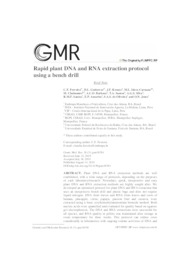Rapid plant DNA and RNA extraction protocol using a bench drill Brief Note.
Rapid plant DNA and RNA extraction protocol using a bench drill Brief Note.
Author(s): FERREIRA, C. F.; GUTIERREZ, D. L.; KREUZE, J. F.; ISKRA-CARUANA, M. L.; CHABANNES, M.; BARBOSA, A. C. O.; SANTOS, T. A.; SILVA, A. G. S.; SANTOS, R. M. F.; AMORIM, E. P.; OLIVEIRA, S. A. S. de; JESUS, O. N. de
Summary: Plant DNA and RNA extraction methods are well established, with a wide range of protocols, depending on the purposes of each laboratory/research. Nowadays, quick, inexpensive and easy plant DNA and RNA extraction methods are highly sought after. We developed an optimized protocol for plant DNA and RNA extraction that uses an inexpensive bench drill and plastic bags and does not require liquid nitrogen. DNA from leaves and RNA from leaves and roots of banana, pineapple, citrus, papaya, passion fruit and cassava, were extracted using a basic cetyltrimethylammonium bromide method. Both nucleic acids were quantified and evaluated for quality based on agarose gel electrophoresis. The DNA and RNA extractions were successful for all species, and RNA quality in pellets was maintained after storage at room temperature for three weeks. This protocol can reduce costs considerably in laboratories with ongoing routine activities of DNA and RNA extraction for genetic diversity and gene expression analyses, where other conventional methods have not been successful due to explant, condition of samples and quantity and quality of nucleic acids. This is especially relevant for many laboratories in developing countries where the cost and availability of liquid nitrogen may be a constraint.
Publication year: 2019
Types of publication: Journal article
Unit: Embrapa Cassava & Fruits
Observation
Some of Embrapa's publications are published as ePub files. To read them, use or download one of the following free software options to your computer or mobile device. Android: Google Play Books; IOS: iBooks; Windows and Linux: Calibre.
Access other publications
Access the Agricultural Research Database (BDPA) to consult Embrapa's full library collection and records.
Visit Embrapa Bookstore to purchase books and other publications sold by Embrapa.

